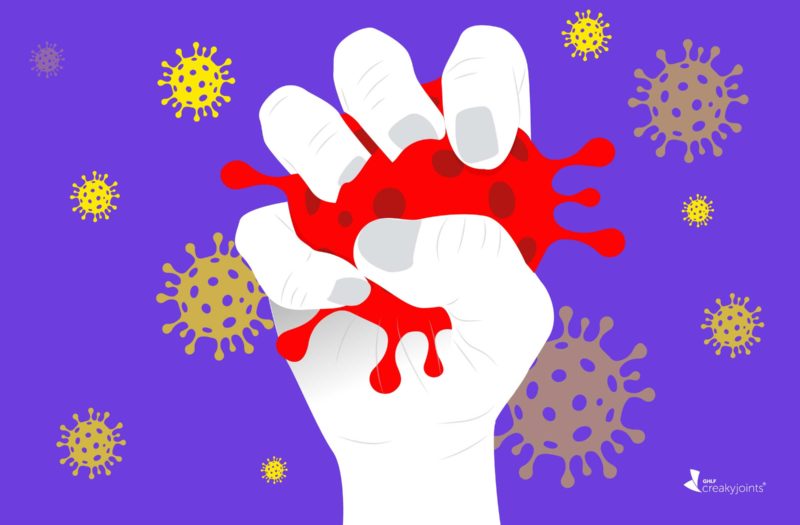Learn more about our FREE COVID-19 Patient Support Program for chronic illness patients and their loved ones.
If you live with an underlying chronic condition that puts you at high risk of COVID-19, you may already be dealing with anxiety during this time of uncertainty, whether it’s about getting sick yourself, managing your underlying illnesses, or being isolated from loved ones.
Anxiety is just one of the mental health conditions taking a large toll on Americans right now. What’s more, it appears that increases in mental health conditions during the COVID-19 pandemic are disproportionately affecting certain groups, new research shows. These include:
- Young adults
- Hispanic communities
- Black communities
- Essential workers
- Unpaid caregivers
- People with preexisting psychiatric conditions
From June 24 to June 30 this year, a total of 5,412 adults completed web-based surveys about their mental health, according to a new U.S. Centers for Disease Control and Prevention (CDC) report. Researchers assessed symptoms of anxiety disorder, depressive disorder, and COVID-19-related trauma- and stressor-related disorder (TSRD).
The researchers also looked at whether or not respondents had started or increased substance use as a way of coping with stress or emotions related to COVID-19, and if they had seriously considered suicide recently.
The researchers found that 40.9 percent of respondents reported at least one adverse mental or behavioral health condition, including:
- Symptoms of depressive disorder or anxiety disorder: 30.9%
- Symptoms of TSRD related to COVID-19: 26.3%
- Starting or increasing substance use to cope with COVID-19 stressors and emotions: 13.3%
The number of people who had seriously considered suicide in the 30 days before completing the survey (10.7 percent overall) was significantly higher among certain groups of respondents, including:
- Self-reported unpaid caregivers for adults: 30.7%
- Respondents ages 18 to 24 years: 25.5%
- Essential workers: 21.7%
- Minority racial/ethnic groups
- Hispanic respondents: 18.6%
- Non-Hispanic Black respondents: 15.1%
Overall, at least one adverse mental or behavioral health symptom was reported by more than 50 percent of respondents who were ages 18 to 44, of Hispanic ethnicity, essential workers, unpaid caregivers for adults, who held less than a high school diploma, or who reported treatment for diagnosed anxiety, depression, or PTSD at the time they took the survey.
The level of anxiety disorder symptoms was approximately three times higher than that reported in the second quarter of 2019. The prevalence of depressive disorder was approximately four times that reported in the second quarter of 2019. However, year-over-year comparisons may be somewhat affected by differences in survey design.
There were also several limitations to this study, including the fact that respondents self-reported their substance use behavior (which makes responses subject to biases) and that the web-based survey may not be fully representative of the United States population.
Still, the results help shed light on the psychological impact of the COVID-19 pandemic, and underscore the need to prevent and treat these mental health conditions. The researchers recommend exploring solutions such as an expanded use of telehealth to deliver treatment for mental health conditions. They also note that identifying populations at increased risk for psychological distress and unhealthy coping can inform policies to address public health inequity.
What to Do If You’re Experiencing Serious Mental Health Concerns
There are also steps you can take right now if you need support coping. It’s understandable and perfectly okay if you’re feeling different at this time. Remember that everyone reacts differently to stressful situations and the COVID-19 pandemic is especially stressful for people with chronic diseases.
Here are general health and mental health resources for your reference:
- If a mental health concern is an emergency for you or someone else, call 911.
- To find local support groups and services, call 1-800-950-NAMI (6264) or emailinfo@nami.org. The NAMI HelpLine can be reached Monday through Friday, 10 AM to 6 PM, EST.
- For the National Suicide Prevention Lifeline, call 1-800-273-TALK (8255) for English or 1-888-628-9454for Spanish.
- For free, confidential, and 24/7 treatment referral and information for mental and/or substance use disorders, call SAMHSA’s National Helpline at 1-800-662-HELP (4357).
- For a counselor or therapist in your area, here’s a resources page.
We encourage you to join our GHLF COVID-19 Patient Support Program. This free program is for chronic illness patients and their families to access updated information, community support, and other resources tailored specifically to your health and safety.
You can also look for healthy ways to cope with your feelings during COVID-19, like mindfulness and meditation. The CDC recommends additional strategies such as:
- Taking breaks from watching, reading, or listening to news stories
- Taking care of your body through stretching, eating healthy, getting plenty of sleep, exercising regularly and avoiding excessive alcohol and drug use
- Making time to unwind.
- Connecting with others, even if it’s just with a phone call
Talk to your health care professional about how you’re feeling and what steps you can take, and check in with your loved ones regularly to see if they need help during this time.
Get Free Coronavirus Support for Chronic Illness Patients
Join the Global Healthy Living Foundation’s free COVID-19 Support Program for chronic illness patients and their families. We will be providing updated information, community support, and other resources tailored specifically to your health and safety. Join now.
Coping with Stress. Coronavirus Disease 2019 (COVID-19). U.S. Centers for Disease Control and Prevention. July 1, 2020. https://www.cdc.gov/coronavirus/2019-ncov/daily-life-coping/managing-stress-anxiety.html.
Mental Health, Substance Use, and Suicidal Ideation During the COVID-19 Pandemic — United States, June 24–30, 2020. Morbidity and Mortality Weekly Report (MMWR). U.S. Centers for Disease Control and Prevention. August 14, 2020. https://www.cdc.gov/mmwr/volumes/69/wr/mm6932a1.htm?s_cid=mm6932a1_w.






